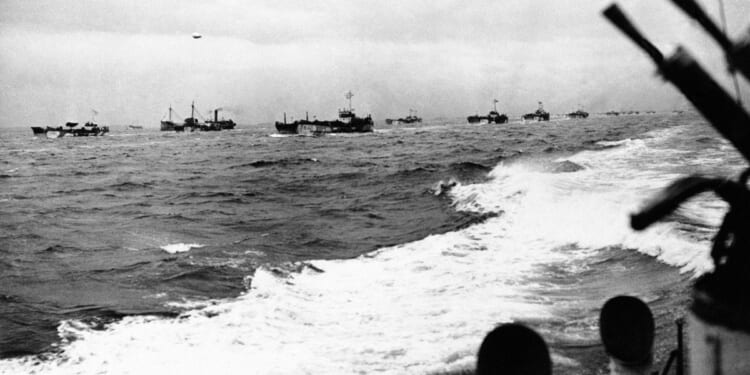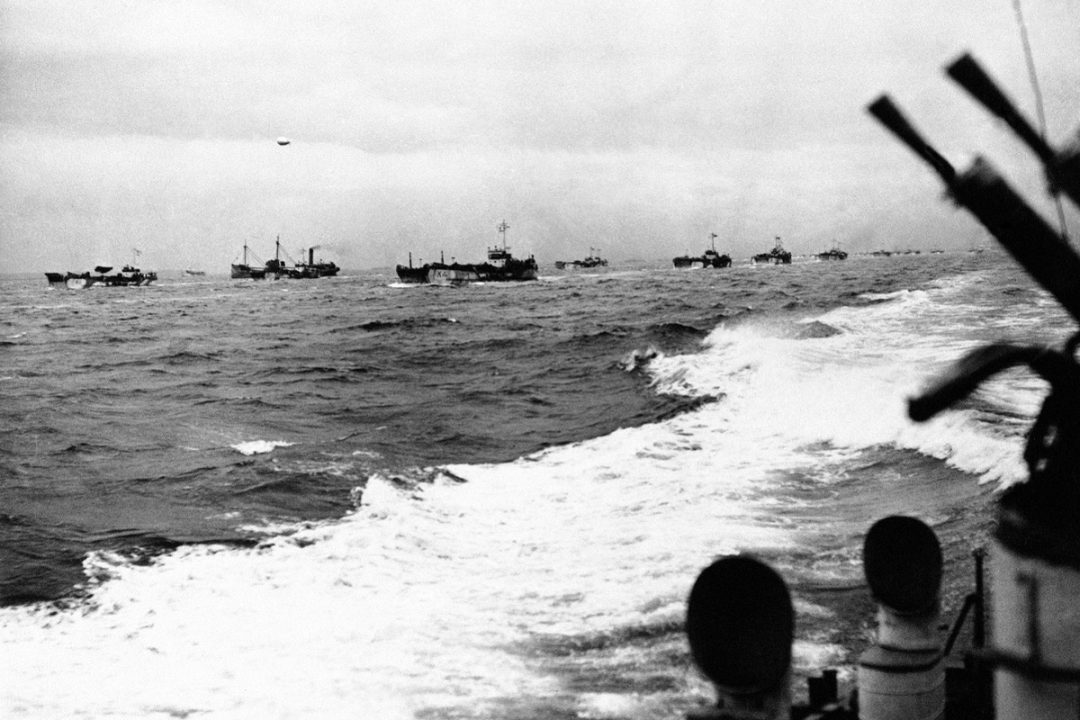
The “sacrifice” necessary to win WWII “wasn’t worth the result that it is now.” So said a Good Morning Britain (GMB) guest on Friday in a now viral interview clip. And if anyone is entitled to make such a comment, it is that guest: 100-year-old Alec Penstone.
Penstone, you see, is a Royal Navy veteran who was involved in the famed and storied D-Day landings in 1944. As is said, he “paid his dues” — in spades.
Mr. Penstone’s comment certainly surprised GMB hosts Adil Ray and Kate Garraway, too, the latter of whom consoled him. It didn’t surprise, however, the millions of internet viewers who sympathize with the centenarian’s lament. That is, he and his comrades fought for “freedom,” he explained — yet today things are “a darn sight worse.”
Fox News reports on the story:
As people across the British Commonwealth don the poppy to commemorate soldiers who died since World War I this Remembrance Sunday, Penstone was asked on “Good Morning Britain” what the day means to him.
“My message is, I can see in my mind’s eye, rows and rows of white stones, of all the hundreds of my friends and everybody else, that gave their lives — for what?” he replied to the show’s hosts. “The country of today… No, I’m sorry, the sacrifice wasn’t worth the result that it is now.”
“What do you mean by that, though?” one host [Ray] asked.
“What we fought for was our freedom — we fought for it. Even now, it’s a darn sight worse than when I fought for it,” Penstone said.
The Sacrifice
Mr. Penstone certainly was in the thick of things during WWII (1939-’45). As The Telegraph writes, relating his sacrifices, he
was 15 years old and working in a factory when the war broke out in 1939. He later volunteered as an air raid precautions messenger, delivering messages while telephone lines were down, before joining the Royal Navy.
He was drafted and assigned on board a submarine in 1943 before moving to HMS Campania, which swept for mines and searched for U-boats during the D-Day landings on June 6, 1944.
Returning to the interview and as mentioned earlier, host Garraway consoled Penstone. Addressing his sentiments, she said:
I’m so sorry you feel like that, because I want you to know that all the generations that have come since, including me and my children, are so grateful for your bravery…. It’s our job now, isn’t it, to make it the country that you fought for?
A video of the entire exchange is below.
Penstone thanked Garraway for her sympathy. The host was correct, too, in saying that it’s now our job to pick up his baton and fight for civilization. Yet given that she’s said to lean “left,” does she really know what country, character-wise, Penstone “fought for”?
Fall From Grace
Of course, we don’t know precisely what Penstone was lamenting. He wasn’t specific, after all, about the freedoms he was alluding to. What we do know is that the demoralization he reflects is widespread in Britain. As The Telegraph reported today in a different article:
Surveys of public opinion confirm that United Kingdom nationals feel that their country has “got worse” in the last five years and “will not get any better” in the next five years.
We also know what, in response to Penstone’s comments and generally, many Westerners are implicating as the problem. As one X user posted, reacting to the GMB interview:
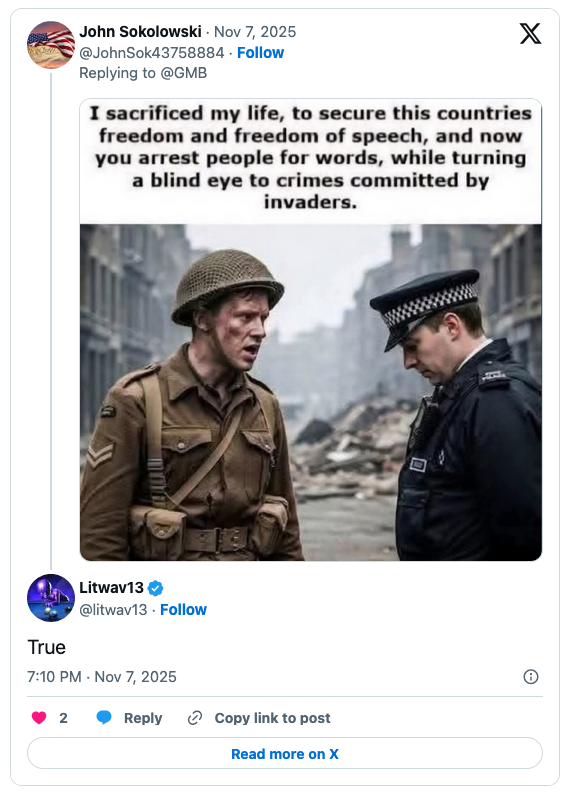
Referenced above is how British police now arrest approximately 12,000 people yearly for politically incorrect internet postings. This amounts to more than 30 arrests a day.
Many such web posts relate to criticism of immigration policy, the sexual devolutionary agenda (“LGBTQ+”), or Islamic influence in Britain.
The iron-muzzle standard is so bad, too, that it’s news (and a bit of good news) that a U.K. judge just had to rule that criticism of Islam is a “protected belief.”
Another X user (below) responding to the Penstone story also cited Britain’s migration woes as an issue.
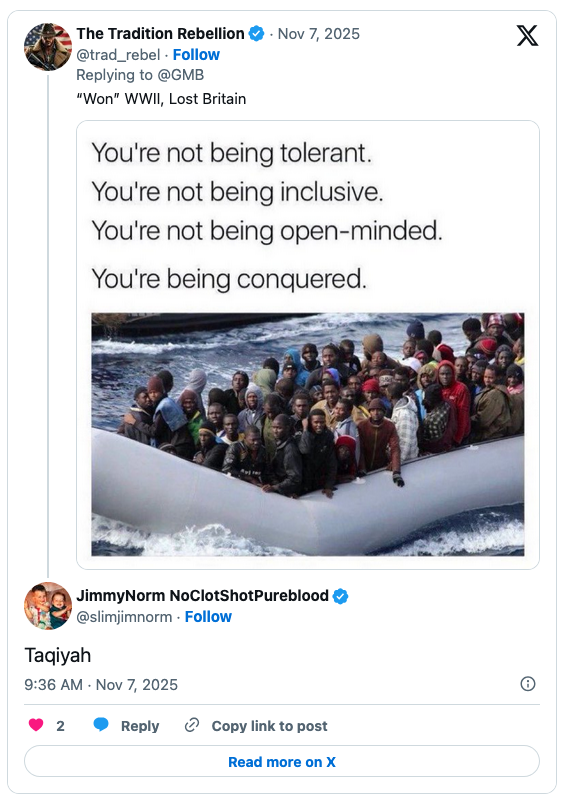
Know here that 35-40 percent of U.K. minors under 18 have a “migration background.” (The story is similar in Germany.) In other words, indigenous Britons are slowly disappearing. Note, too, that such demographic destruction is considered unconscionable when it happens, let’s say, to an Amazon jungle tribe. When it’s visited on a Western population, however, it’s called nation-strengthening “diversity.”
Then, the following X respondent posted (below) what are identified as letters from WWII veterans. The correspondence expresses disenchantment with migration and the state of the culture.
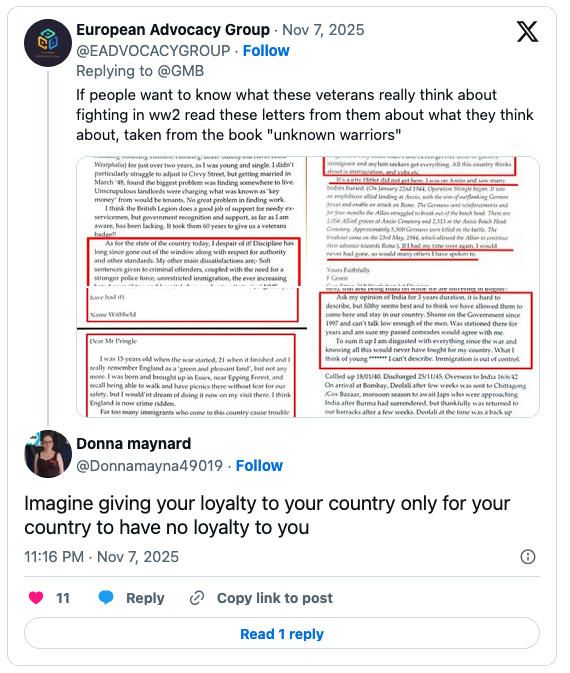
Beyond Britain
Of course, this cultural debate — and the phenomenon of disappointed veterans — isn’t confined to Britain. As to this, an American WWII fighter, the late Carl Spurlin Dekle, tearfully lamented the United States’ plight in 2022.
On a personal note, my father, Dr. Roy S. Duke, was also a WWII veteran. Captured in battle while fighting in Europe, he spent time as a POW in Nazi Germany. I’ve no idea if he’d now believe his sacrifice was worth it, and I can’t ask him. He passed away almost 30 years ago. What I can say is that he didn’t go to war so people could march mostly naked in the streets; “transition” children; push DEI (diversity, equity, and inclusion), revisionist history, and anti-American hatred; and, generally, try to turn our civilization into something as bad as what he fought against.
Yet there’s something else we can know. Evil is ever afoot and never rests — and it must be fought in every time and place. WWII ended 80 years ago, and it was always a given that evil would persist, just under a different guise. It’s the job of good people today to combat it, too. That’s perspective — and is easy to understand.
More difficult is staying close to God and Truth so that we recognize the evil and don’t ourselves become it. Remember here, too, that people rarely if ever know it when they’re on the wrong side.

